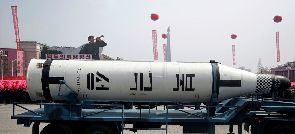Tensions are again flaring up between the United States and North Korea as concerns grow that the communist state will celebrate another important national holiday with a nuclear test or an intercontinental ballistic missile.
On the eve of the 85th anniversary of the founding of the (North) Korean People’s Army, there are reports of renewed activity at the North Korea’s Punggye-ri nuclear test site, although analysts caution it is unclear whether a test is imminent.
Strike force
Meanwhile, two Japanese destroyers joined a military exercise with the USS Carl carrier strike group that is en route to the Korean peninsula region. South Korea said on Monday it was in talks with Washington about holding its own joint drills with the U.S. naval strike force.
In early April, U.S. officials sent out confusing messages that the Carl Vinson group was heading toward Korea in advance of the April 15 birthday of North Korea founder Kim Il-sung, which is often celebrated with a provocative weapons test. Instead of a nuclear test, Pyongyang held a military parade and attempted a mid-range missile test that failed. And the aircraft carrier was, until last week, actually in the Indian Ocean, where it was engaged in training exercises with Australia.
North Korea Sunday responded defiantly to the renewed U.S. military show of force, saying it is “combat-ready to sink a U.S. nuclear-powered aircraft carrier with a single strike,” in a commentary in the North’s ruling Workers’ Party Rodong Sinmun newspaper.
Adding to the tension, North Korea detained a Korean-American man named Tony Kim, who was teaching accounting at the Pyongyang University of Science and Technology (PUST).
He was arrested Saturday at the Pyongyang International Airport on his way out of the country.PUST was founded by evangelical Christians and opened in 2010, with students generally the children of the country’s elite.
The university’s chancellor, Chan-Mo Park, told the Reuters News Agency Sunday, “The cause of his arrest is not known but some officials at PUST told me his arrest was not related to his work at PUST. He had been involved with some other activities outside PUST such as helping an orphanage.”
While Pyongyang allows some foreign religious organizations to undertake humanitarian work, a number of missionaries have been arrested for violating a ban on proselytizing or committing alleged crimes against the state.
Chinese pressure
Reports of a shortage of gasoline in Pyongyang and gas prices rising from 70-80 cents to $1.25 per kilogram at one station in the nation’s capital may indicate that Beijing is intensifying efforts to pressure the Kim Jong Un government to give up its nuclear and missile programs. It is unclear if the gas shortage is due to China cutting off oil supplies or because it threatened to do so. (Gasoline is sold by the kilogram rather than liter in North Korea.)
A Saturday editorial in the Chinese Communist Party newspaper the Global Times said if North Korea conducted another nuclear test, Beijing would increase sanctions that would result in, “dramatically decreasing the amount of petroleum exported to North Korea.” North Korea relies on China, its largest economic trading partner by far, for close to 90 percent of its petroleum imports.
A passenger walks past a TV broadcasting a news report on North Korea’s failed missile launch from its east coast, at a railway station in Seoul, South Korea, April 16, 2017.
A passenger walks past a TV broadcasting a news report on North Korea’s failed missile launch from its east coast, at a railway station in Seoul, South Korea, April 16, 2017.
The Global Times editorial also warned it would not militarily intervene if the U.S. conducted a preemptive strike against a North Korean nuclear facility.
“Beijing should oppose the move by diplomatic channels rather than get involved through military actions,” the editorial stated.
However, the editorial also said China would get involved militarily if South Korean and U.S. troops cross over the inter-Korean border and try to topple the North Korean regime.
South Korea’s Unification Ministry spokesman Lee Duk-haeng Monday said the Chinese Communist Party Newspaper editorial, while not official policy, reflects that Beijing is taking a more assertive role in trying to restrain its ally in Pyongyang.
“As the Chinese government understands that North Korea’s nuclear and missile provocations are serious threatening factors to the peace and stability of Northeast Asia, we understand that China is pressuring at highest level to resolve it,” said Lee.
Trump, Xi
Chinese state television reported that in a telephone call Sunday with U.S. President Donald Trump, Chinese President Xi Jinping, said that he hopes all sides exercise restraint over the issue of North Korea and that China opposes anything that runs counter to U.N. Security Council resolutions.
North Korea analyst Woo Su-keun at Donghua University in Shanghai said the Trump administration’s increased threat of military force has been effective in convincing the leadership in Beijing to take stronger measures to prevent a deadly conflict that could draw the region into war.
“If President Xi does not cooperate with President Trump, President Trump may come up with actions that could impact China both internally and externally, so President Xi’s strategy is to be as cooperative as possible with President Trump,” he said.
Japanese consultations
Japanese Prime Minister Shinzo Abe said Monday he and U.S. President Donald Trump had agreed to maintain close contact over North Korea, while demanding Pyongyang show restraint as tensions in the region rise.
The 30-minute call between Trump and Abe was meant to increase pressure on Pyongyang not to engage in further provocative actions, but was not prompted by any significant change in the situation, according to officials in Tokyo.








